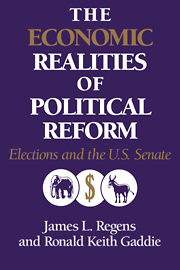Book contents
- Frontmatter
- Contents
- List of tables and figures
- Acknowledgments
- Abbreviations
- Introduction
- 1 The Senate in transition and campaign finance
- 2 Early money and profit taking in Senate campaigns
- 3 Targeting rent provision by major interests
- 4 Sitting in the cheap seats?
- 5 Implications for campaign-finance reform
- 6 Reform and the rent-seeking legislature
- Notes
- Bibliography
- Index
Introduction
Published online by Cambridge University Press: 18 December 2009
- Frontmatter
- Contents
- List of tables and figures
- Acknowledgments
- Abbreviations
- Introduction
- 1 The Senate in transition and campaign finance
- 2 Early money and profit taking in Senate campaigns
- 3 Targeting rent provision by major interests
- 4 Sitting in the cheap seats?
- 5 Implications for campaign-finance reform
- 6 Reform and the rent-seeking legislature
- Notes
- Bibliography
- Index
Summary
In recent years the more prominent face of the Senate has been its individualistic one. The contemporary institution is a collection of entrepreneurs, each one in business for himself or herself, each one with a personal agenda and goals.
Richard F. Fenno Learning to Legislate: The Senate Education of Arlen SpecterThe contemporary debate that surrounds the conduct of congressional elections has its origins in an enduring argument about the importance of money in politics. Among his numerous sage observations about the American political scene, the late Samuel Clemens noted, “Ours is the best Congress money can buy!“ Nonetheless, although a burgeoning literature has emerged examining campaign contributions from organized interests, the lack of a robust, theoretical paradigm that accounts for the dynamics of legislator and interest-group interaction in the context of funding elections is troubling. Arguments over the nature and consequences of proposed changes in the approach to financing congressional elections are often waged without an underlying point of theoretical reference. Reform proposals are presented and bandied about with little consideration for their impacts relative to each other, or collectively, on the political system.
This volume seeks to provide a theoretical yardstick for evaluating those proposals. We contend that the behavior of legislators in seeking financial support for their reelection campaigns can be viewed in the same fashion as profit-seeking firms. Senators are members of a highly exclusive legislative body, whose policy imperatives have farreaching economic and social consequences.
- Type
- Chapter
- Information
- The Economic Realities of Political ReformElections and the US Senate, pp. 1 - 9Publisher: Cambridge University PressPrint publication year: 1995

